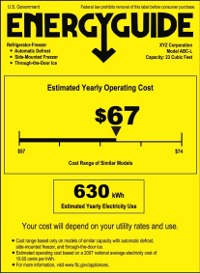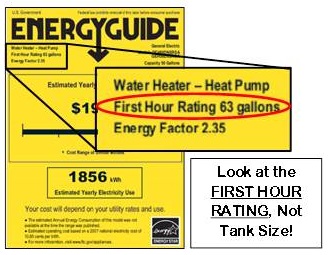The big question for all homeowners is the costs of their energy: electricity and water. If you have a water heater (or you’re interested in buying one) you would like to know how much power does a water heater use. Of course this depends on how big your family is, the personal usage of the warm water, but also on the type and brand of the water heater.
The California Energy Commission says that heating your water contributes to 25 percent of a household’s normal electricity bill and water heaters actually cost more than their fuel/gas counterparts.
In order to calculate the water heater bill, homeowners are required to first know the amount of watts that the device makes use of. This information can be determined on the device’s label.
How Much Watts Heaters Consume and How It Affects Our Energy Bills
 The wattage of an electric water heater is oftentimes displayed on its label, which is located on the side of the unit. This label should be obviously noticeable since it is affixed next to the panel that users have to get rid of when replacing the heating element and that specific panel should be accessible at all times.
The wattage of an electric water heater is oftentimes displayed on its label, which is located on the side of the unit. This label should be obviously noticeable since it is affixed next to the panel that users have to get rid of when replacing the heating element and that specific panel should be accessible at all times.
It shows the wattage and operating voltage of the element and if for example the device operates on 240 volts of power, it typically features two elements so you will be looking at 2 values for the wattage, which is one for every element.
Models operating on 120 volts of power usually have a longer recovery time which is unreasonable for majority of households. 120 volts take in 1,125 watts while domestic 240-volt heaters make use of 4,500 watts. If in case the device features 2 elements, homeowners assume at times that they must augment their wattage to acquire the total energy use of the device. This is not actually right since both elements do not go on simultaneously.
A device featuring 2 elements and a label that indicates a power consumption of 4,500 watts for every element present makes use of a maximum of 4,500, not actually 9,000 watts.
Now we discuss how significant these heating units influence our energy bills. Water heaters are important units to be had since it makes it possible for individuals to take hot showers most especially during the winter months, hot baths and clean our hands using temperate water.
However, they consume plenty of energy which makes using them costly thus knowing the how these devices affect our energy bills could lead you to proper actions on lowering heating expenses.
These devices are rated by EF or Energy Factor and the higher its EF, the more efficient a heater is. EF is the rating used for the total amount of hot water generated every day for every unit of fuel. For these devices, the range of EF starts from 0.75 to 0.95.
The total amount of energy consumed by the device relies on the water tank’s size, the amount of water accommodated, the device’s water temperature setting and whether the homeowner owns an insulated tank.
Standard water heaters operate for 3 hours every day. To calculate its energy usage, we are going to use this as an example; 5,500 model which accommodates 50 gallons with an electricity rating of $.16 each kilowatt hour will take you back $781 to manage yearly. Majority of these devices feature a label documenting the yearly operational expense.
Tips for Decreasing Water Heater Energy Use
In order to cut costs on water heater usage, we have to know how to heat our water supply efficiently. Here are a few tips you can use to make cutting costs a possibility.
 Take short showers and minimize your time in it. Longer hot showers will require more hot water to use, and even though a warm bath feels nice at times, it is still considered a luxury. Hence, stick to short showers. You can also try switching the water off while shampooing or sudsing up. Furthermore, it will be wise to try lowering the heater’s temperature to 120°F because for each 10ºF decrease in temperature, homeowners can cut costs for up to 3-5 percent on water heating expenses.
Take short showers and minimize your time in it. Longer hot showers will require more hot water to use, and even though a warm bath feels nice at times, it is still considered a luxury. Hence, stick to short showers. You can also try switching the water off while shampooing or sudsing up. Furthermore, it will be wise to try lowering the heater’s temperature to 120°F because for each 10ºF decrease in temperature, homeowners can cut costs for up to 3-5 percent on water heating expenses.- Make use of cold water if you are doing the laundry and make sure that you use them for the rinse cycle.
- Know how to operate your dishwasher efficiently. Work with full loads only, set off its booster heater if it features one and opt for shorter washing cycles.
- Do not let all that clean, warm water go to waste. Do not leave the water on while brushing your teeth of cleaning your hands. Repair leaky faucets since a single drip for every second can take you back a dollar each month.
- Mount fixtures that are low in flow. Due to Federal regulation demands, a household should now include new faucets and showerheads that have low-flow ratings. Faucets and showerheads predating 1992 consume more water as compared with upgraded ones.
- To cut 15-30 dollars on your water heater bill, try mounting heat traps on the heater tank. This procedure might require the assistance of a professional but several models of water heaters now include heat traps.
- Try insulating the initial several feet of hot and cold water pipes that are linked to the heater.
- Try insulating the hot water storage tank but keep in mind not to cover the top of the heater’s thermostat, burner section, its top and bottom. As for electric tanks, keep in mind not to cover its thermostat.
- Mount a timer that is capable of switching the device off at night of times when you are not using it. You can also try switching it off during the device’s highest demand points.
- Purchase a new water heater since there are current, more energy-efficient models available now.
- Try using more Energy Star dishwasher and water heater models. By saving energy and using this kind of product, you will cut expenses for up to hundreds of dollars each year. Energy Star is a symbol that is employed to indicate energy efficiency.
An appliance is given this rating if it is considerably more energy efficient than the minimum government specifications as concluded by conventional testing processes. The quantity by which an appliance should surpass the minimum standards varies for every product given the rating and it also relies on the technology that is on hand.



Be the first to comment on "How Much Power Does a Water Heater Use?"